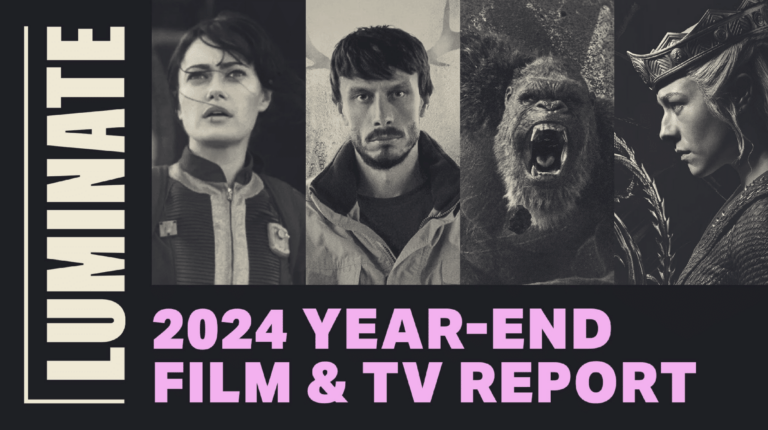New Report Shows Trends in Fantasy and Sci-Fi Entertainment in 2024
A new report from Luminate Data gives new insights into what’s been happening in the entertainment world in 2024.
Last year saw plenty of high-profile releases, and this report shows the highs and lows of the past twelve months. While it deals with all areas of film, TV, and streaming, there’s plenty of data on fantasy and sci-fi releases, with hints at what to expect from the industry in 2025.
In almost every category, US production has taken big hits. Broadcast TV has ticked up the number of shows produced slightly, but in contrast, streaming has seen a big hit to its numbers. While Prime Video and Netflix has small rises in the number of original shows being released, Max, AppleTV+, and Paramount+ all saw dips, while Disney+ saw the biggest drop of all, from twenty five in 2023, to just nine last year, the lowest since the platform launched, showing how Hollywood is still struggling to get back up to speed, following the Covid shutdowns, and strikes, which have delayed so many productions.
Star Wars & Marvel Take a Hit
While Disney+ is far from the biggest streamer, it does hold some huge IPs, like Star Wars and Marvel, which you’d expect to be doing big numbers, but there’s a mixed story being told here.
‘The Acolyte’ was the second most watched show on the platform, with a combined total of 2.6 billion minutes watched across 2024. It also has a reasonable launch, with 2.25 million views on its first episode. This didn’t hold up though, and its final episode had less than one million views on launch. This, combined with its negative reception and high budget give a good enough explanation of why Disney chose to not renew the show for a second season.
The other big live-action ‘Star Wars’ show released last year was ‘Skeleton Crew’. This ’80s-inspired adventure had a warmer reception from fans and critics had a warmer reception from fans and critics, but an even worse opening, barely managing two million views during any week of release, barely half of what ‘The Acolyte’ managed at its peak.
This points to bigger problems with the franchise, which is one of the most well-known IPs, but still has some of the worst figures for such tentpole releases. There’s only one big show coming this year, the second season of ‘Andor’, which despite its critical acclaim hasn’t been as big a ratings hit as other ‘Star Wars’ shows, so it’s unlikely to make a big change to these figures when it debuts in April.
For Marvel, things were looking bad too. ‘Agatha All Along’ managed to get 2.25 billion minutes watched, which isn’t too bad for a more niche show that doesn’t focus on superheroes, but ‘Echo’ barely managed 1.5 billion, little more than the animated reboot ‘X-Men ’97’.
It wasn’t all bad news for the streamer, as they had a reasonable hit with ‘Percy Jackson and the Olympians’, which came in with three billion minutes watched in 2024, which is good considering the show had its premiere in December the previous year. It’s a sign that Disney needs to get away from its in-house franchises, and take a chance on new content to get hits. There was already a big fanbase for Rick Riordan’s YA novel series about the Greek gods, and it had yet to see a good adaptation before this, so there could be hope that Disney will look at adapting more books, like ‘Eragon’, which they acquired the rights to some years ago.
But despite this hit, it’s clear things aren’t going well for the House of Mouse. Aside from ‘Percy Jackson’, all of the streamer’s top 10 were from Marvel and Star Wars, but two were animated (‘X-Men ’97’ and the final season of ‘The Bad Batch’) and three of them were old released, including seasons one and three of ‘The Mandalorian’ and ‘Ahsoka’. These are poor results for what should be huge franchises, and show how little impact most of these streaming series have on wider pop culture.
Netflix Dominates the Top 10 Chart
It’s no surprise that Netflix is still the biggest streaming platform, with a massive 63% share of total streaming viewing time in 2024, which is a big number, considering a lot of their biggest shows were on hiatus last year. Even their second season of ‘Squid Game’ arrived too late to be counted.
Out of the top 10 streaming originals, Netflix managed to steal seven of the spots, with shows like ‘Bridgerton’. But it was a dry year for fantasy and sci-fi on the chart, with ‘Fallout’ the only genre show to get a place. Prime’s adaptation of the popular video game series clocked almost eight billion minutes watched since its release in April, promising the platform good things for its second season, and promising more adaptations in the future.
As important as what made it into the top 10 is what missed out. Despite being their flagship release, based on one of the biggest fantasy IPs, and with a massive budget, ‘The Rings of Power’ failed to take a spot, which could put other streamers off producing more expensive high fantasy shows.
While we’ve mentioned Star Wars and Marvel, there’s another big franchise that’s conspicuous in its absence, Star Trek. Despite Paramount+ being the third biggest streaming platform, almost on par with Prime (7.8% vs 8.5% share), and Star Trek having huge brand recognition, there was no room for it in the top 10, even though the platform managed to get two hits onto the chart, Sylvester Stallone’s ‘Tulsa King’, and ‘Landman’ which took the number three spot.
This wasn’t for want of trying, though, as there were three shows released this year: the animated series ‘Prodigy’ and ‘Lower Decks’, and the final season of ‘Discovery’, which is meant to be their headline release. It shows how far these franchises have fallen from when they were ratings hits, and how putting them on smaller streaming platforms risks them becoming niche.
One area that’s had a big boost in recent years is animation, which has been lifted from being mainly children’s or comedy shows, with massive releases like ‘Arcane’ and ‘Blue Eye Samurai’. Many streamers have put their resources into animated shows, often as spin-offs of established franchises, though they still struggle to reach the popularity of live-action counterparts. This could be the reason for production being dialed back, with a 27% reduction in the number of new orders for animated shows last year.
Sequels Steal the Box Office
This drop in animated shows is a huge contrast with the movie industry, where several of the biggest hits were animated. Most of them were big name family released from well-established studios, with Walt Disney Animation and Pixar managing billion dollar sequels in ‘Moana 2’ and ‘Inside Out 2’ respectively, while Illumination got close to that with ‘Despicable Me 4’ bringing in $969 million, while critical hits like ‘The Wild Robot’ managed to make their mark, and get lined up for awards season.
If you saw a movie in theaters in 2024, there’s a good chance it was a sequel, with many being box office successes, both animated and live-action, from ‘Alien: Romulus’ to ‘Gladiator II’.
Overall, there was a slight rise in the number of movies released last year, 1230, up from 1125 in 2023, though separate reports have highlighted that total box office receipts were down 3%.
A big winner this year was horror, which has the benefits of low production costs and hardcore fans who are always on the lookout for more scares. Sci-fi horror was the king though, with two sequels taking the top places, ‘Alien: Romulus’ and ‘A Quiet Place: Day One’.
The age of the sequel doesn’t look like it’s going to end anytime soon, either, as 2025 has some big legacy releases lined up, from the likes of ’28 Years Later’, ‘Tron: Ares’, and ‘Jurassic World: Rebirth’.
It’s become obligatory now that most movies end up on a streaming platform within a few months, or even weeks, of their theatrical debut, and this year has seen some big numbers for both new and old titles.
‘Moana’ took the top spot for most streamed movie, no doubt aided by the release of its sequel, while ‘Inside Out 2’ proved a popular choice too. In fact, four of the top 10 most streamed movies belonged to Disney+, which shows the streamer has some appeal to younger viewers, and also has an impressive catalog of content to draw on, that still performs well years after release.
Unsurprisingly, Netflix also got half the spots on the chart, but managed to get one of their own originals, the airplane thriller ‘Carry-On’ to number five, which must be satisfying for a platform that wants their homegrown movies to be taken more seriously.
The Future
What does all this data mean for the future of sci-fi and fantasy? Clearly, it shows that there’s still a big audience for the genres, especially in movie theaters, and popular franchises are still doing big numbers. ‘Alien: Earth’ is expected this summer, bringing the Xenomorphs down to our planet for the first time, while other shows will be getting new seasons, from the likes of ‘Percy Jackson’ and ‘Squid Game’, while Netflix hit ‘Stranger Things’ will have its fifth and final one towards the end of the year.
But, while these might be successful, it’s important to note that a lot of older franchises simply can’t rely on their legacy to bring in viewers anymore. Despite still pumping out content, Star Wars and Star Trek simply aren’t doing the numbers they used to, and even the comparatively young MCU can’t get a streaming hit. While ‘Rings of Power’ should have blown away all competition, it’s fallen off sharply since its premiere, and isn’t the success Amazon hoped for.
On the movie side of things, there’s clearly a lot of money to be made from sequels, even if there is some fatigue starting to set in. In a segment of the report, moviegoers were asked what they would like to see from a franchise if it returned after more than ten years away. 40% responded that they would like to see the same characters and stories return, compared to 28% who wanted new ones. This was in contrast to a mere 12% who would like to see a remake. But, it’s important to note that 20% said they didn’t believe the franchise should return at all, something that should be thought on in the wake of ‘Gladiator II’, as Hollywood runs out of franchises to reboot for nostalgia.
Even so, with the risk of making new and original IPs, the safety in the familiar, support of built-in fandoms, success of recent sequels, and the need for constant content on streaming platforms, it doesn’t look like the studios will turn away from their legacy franchises just yet. But if they want them to survive beyond the next few years, they need to take action now to save them, before they become irrelevant.




